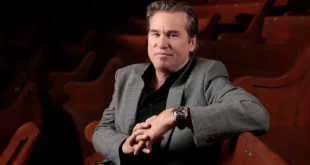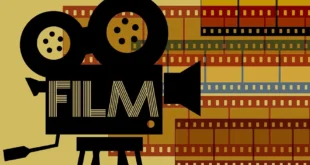It’s easy to be intimidated by anime. The subtitles, the cultural differences, and the frenetic animation style make most of the genre seem inaccessible or opaque to the mainstream US of A. This might seem truest with the dense, dark, gruelingly paced anime series Death Note. On paper, the show sounds confusing, and I’m curious to discover how Adam Wingard, the mind behind You’re Next (2013), handles turning the show into a feature film. The plot follows a bright high schooler, Light Yagami, who discovers a note book that can kill people (the titular “Death Note”) and decides he is to become the arbiter of justice and the God of a new world where he controls life and death. The new trailer to Wingard’s Netflix exclusive Death Note movie has dropped, so I’ve taken it upon myself to convince you to give this anime a shot. Here’s a handful of reasons that the Death Note anime is worth every horror fan’s time and attention.
1. The show is basically Se7en (1995) with teenagers

Se7en, David Fincher’s bleak masterpiece of serial murders and a sad Morgan Freeman, was a perfect movie. Well, almost perfect. It needed moody teenagers. With Death Note’s protagonist, Light Yagami, that wish is granted. He’s a charismatic, mopey sociopath with a moralistic streak that makes Kevin Spacey’s John Doe look like my neighbor’s dog, Tucker. For the record, Tucker is a fat dog older than most libraries and isn’t a serial killer. I think.
2. L is the Sherlock Holmes that Benedict Cumberbatch looks up to and pouts about

Set in opposition to Death Note’s murderous protagonist is the mysterious detective known only as L. No story is worth telling without a compelling villain, and L is compelling in ways compelling things sit around and talk about. His identity is shrouded in secrets and paranoia, and wherever Light dares to flex his intellect or the power of his Death Note, L is there to outwit the snot out of him. The show quickly develops into a high stakes, frantic runaway train, and that train unceasingly hurtles towards a cat-and-mouse game between two competent, brainy people. It’s a game of chess where both players are fourteen thousand moves ahead of us and one step ahead of each other.
3. The Shinigami (Gods of Death) add a layer of Hellraiser-esque mythos to the show

I’m a huge fan of Clive Barker’s Hellraiser (1987). The film feels like a massively fleshed out mythology that we as the audience can only glimpse. Death Note flashes between the main plot on Earth and the quotidian goings-on in the Shinigami Realm. In the Death Note universe, the forces of death are controlled by strange and eccentric creatures called Shinigami. Each one of these Gods of Death are subject to the same boredoms and personality quirks that humans are. Seeing these small glimpses into their world fleshes out Death Note in the same way the cenobites made Clive Barker’s Hellraiser a triumph of world building and imagination and more than just another ghost story.
4. The show balances horror and comedy the way all the best slasher films do

If you’re a horror fanatic, you understand that humor is crucial to the grammar of quality slasher cinema. Between the bumbling antics of Friday the 13th teens and Freddy Krueger’s gallows humor in the Nightmare on Elm St. series, it’s just become a given in the subgenre. Despite working with far more ingredients and cooking up something more subtle than the average slasher film, Death Note understands this grammar and includes a healthy dose of humor. The antics of the omnipotent and seemingly addicted-to-apples Shinigami, Ryuk, and the melodrama of Light’s megalomaniacal rantings create genuine laughs. This punctures the swelling balloon of the series’ ceiling-high stakes and creates a tonally diverse, entertaining show.
5. Death Note only has two speeds: fast and “Jesus Take the Wheel”

The way the show hurtles towards each story arc and end credit sequence makes Game of Thrones look like a slog. Death Note seems to have no regard for the average viewer’s need for breaks or a chance to catch their breath. But you’re a horror fan, right? You’ve long since known that catching your breath is overrated when there’s a plot that can take it away.
6. The show is full of elaborate and intriguing Saw-like rules

Here’s a small confession… I love shows and movies that center around a deadly game with complicated rules. The Saw films are my jam. The Most Dangerous Game (1932) is my jam. Death Note is my jam. The central conceit of the show is that any name written in the Death Note dies. However, underneath that simple premise is a swirl of rules about time of death, limitations of which people can be killed in a Death Note, how a type of death can be specified, and endless specifications that will leave the dedicated crime-hound in all of us struggling to find the limitations and implications of each rule. It’s a puzzle, and you get to solve it.
7. There are set piece deaths in this show that make would any horror fan happy

As early as the series’ pilot, there’s a Death Note-induced murder set piece that has all the Final Destination (2000) hairs on the back of my neck standing at attention. No spoilers, but it involves a truck and a biker who needs help understanding consent. It’s glorious and violent and I’m grinning right now just writing about it. Unless Light specifies, the victims of the Death Note die of heart attacks. But, and thank goodness for this “but,” Light does a lot of delicious and exciting specifying.
8. It’s got big ideas, and no clear, obvious answers

Most of the horror fans I know are into the show Dexter. Light, rather than kill just anybody, or serve his own selfish motives, decides to kill criminals to make the world a better place. He sees himself as Justice Incarnate. The show, rather than make this some kind of belabored fable about the dangers of vigilantism or the nature of right and wrong, asks those questions but trusts you to come up with your own answers. Morality, criminality, mortality, religion, fandom, and human connection all come into play in Death Note. But the show, like the best horror movies in the genre, knows that we’re grown ups who can think for ourselves.
9. It’s Japanese – and nobody does supernatural horror like the Japanese

I mean, come on. I don’t need to cleverly and eloquently defend this one. You’ve probably seen Ringu (1998) or Ju-On (2002) or Shutter (2004) by now. You get it. Thankfully, with Death Note we’re spared the lanky-haired, anemic nightmare fuel of those movies, and are given the rich mythology I mentioned in #3.
10. You don’t have to watch with subtitles

If you’re a purist for anime, this should be moot. For the newcomer to the genre, though, this could be a blessing. If you’re one of those people who does laundry or homework while they watch their horror, you’ll be pleased to know that the English language dub cast are top notch. They give the show their own inflection and their own delivery that inform the drama in their own unique ways. Ryuk is given a scratchy, wheedling voice. Light has the haughty impertinence of every teenager ever. L sounds dispassionate and superior. The show’s translators also found ways to naturalize the language of the show so it doesn’t have that bizarre, translated feeling that some dubbed anime have.
Finally,
11. You’ll look really cool to your horror friends

As all your bros and sisters in horror stare bug-eyed and chatter-teethed at Wingard’s new interpretation of the show hitting Netflix in August, you, after having watched the thrilling and high-octane thirty-five episodes of the original anime, can chuckle, shrug and say what every horror nerd who’s ever existed longs to say in moments like this. “Yeah, it’s got nothing on the original.”
 PopHorror Let's Get Scared
PopHorror Let's Get Scared



